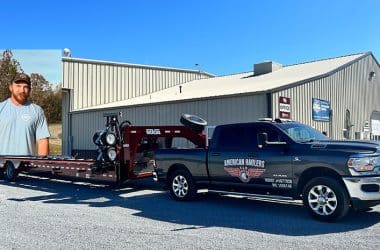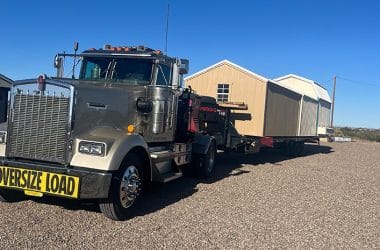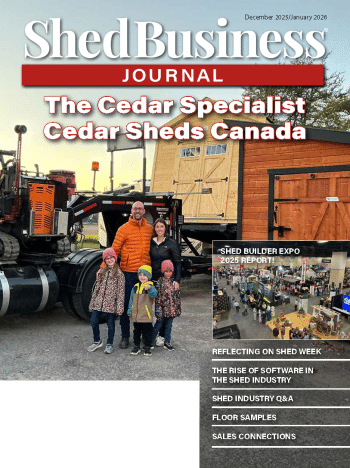
Some people, especially outside the industry, look at shed hauling as an easy business.
Truck, trailer, shed, move, done. But those with a few years in the shed business know it’s nowhere near that simple.
People, including some haulers, forget another more complicated part of hauling—the business side.
Shed hauling is a business, and haulers need to know things like operating costs, equipment maintenance schedules, insurance (see the article on page 64), licenses, permits, and record keeping.
Shed Builder Magazine spoke with two veteran shed haulers—Cliff Knepp, owner/operator of Knepp Trucking LLC in Odon, Indiana, and Mervin Miller of Miller Express in Blackville, South Carolina—to find out how they handle the business side of their hauling operations.
What do you wish you knew about the business side of shed hauling when you were starting out?
KNEPP: By the grace of God and the help of my beautiful family, we are currently running a fleet of eight trucks. We have one semi running flatbed OTR, one semi running a long wagon dump trailer, and six full-time shed rigs. We also have two full-time dispatchers, which allows me to do what I love and still run a shed rig as much as I can!
It all started back in 2006 when I started running escort and doing site builds for a local shed company. I was doing construction prior to that so I enjoyed the job. About two months into the job, the current hauler at this company decided he wanted to go into logging full-time, so the story begins in the shed-hauling world for me!
I was green as a grasshopper on hauling wide loads down the road but was ready for a challenge and have thoroughly enjoyed it ever since. Again, I was very inexperienced and knew nothing about trucking but with the financial help of the shed shop where I was working, I was able to get a 1-ton Duramax dually on the road, then with the help of a retired DOT officer I was able to get everything legal and finally hauling sheds full time.
As a young man of 22 years old, watching everyone move over or park on the side of the road while your big load passed them made you feel your masculinity in full bloom.
Knowing a little more about trucking and the legal side of it before going full-time would have probably saved me some headaches and some fines, but it also made me learn really quick.
MILLER: When I started out, it was not nearly as cutthroat as it is now. I already had been running my own business for quite some time (not shed hauling), so I was not new to running a business.
The shed hauling business can be quite a challenge trying to balance growth vs. opportunity vs. equipment costs, etc.
What are the key business elements shed haulers need to know/keep in mind regarding equipment?
KNEPP: On the subject of equipment, you could talk all day. Should I buy a Chevy, a Ford, or a Ram? Should I buy a Freightliner, a Volvo, a Kenworth, or a Peterbilt? I have owned most of the list above at some time, and I can assure you they will all break down sometime.
As for your trailer, you can buy a Myers, WKM, and several more kinds, or the most sought after it seems, Pine Hill, but again like I said they will all break down at some point, I would recommend, the year, make, and model that is available and affordable to you at the time.
Maintenance is very important. The first big key is having your fleet on a regular maintenance schedule, keeping everything in top-notch shape as much as possible will keep you on the road for as long as possible.
Another key thing is keeping an extra chunk of change in the bank for a rainy-day breakdown. It’s always good to have a backup plan.
MILLER: Keep up with your maintenance—cannot stress that enough! The better your preventive maintenance program, the less chance you will have the minor (or major) issues that can sideline your rig for days (or weeks).
Also, don’t be pressured into buying the latest, greatest, shiniest stuff that comes along. Know what you can afford to purchase, maintain, and insure.
How about for the money/paperwork side?
KNEPP: There are also a lot of things to keep in mind on the paperwork side of the business. Things behind the scenes are registrations, IFTA, permits, and insurance, to name a few.
There are third-party companies out there that can help with a lot of these things. I personally file most of it myself, but it is not a bad idea to use those companies at times if they are trustworthy and do a good job for you, thus allowing some more time for you to dedicate to your family or other things in the business.
MILLER: We have been very fortunate to be in a position where we do not need to chase payment. The company we haul for does direct deposit, so money is in the account every Monday.
However, you must do paperwork and stay on top of it if you expect to get paid. Most of what I do (personally) is paperwork. Permits, business licenses, logs, keeping tabs on building moves, etc.
If you don’t like doing paperwork, you need to find someone to do it for you. It will not get done by itself.
How can a shed hauler best analyze his business to see if employee-equipment-customer growth is needed or even possible?
KNEPP: First of all, look at the amount of work you have on a daily basis, not just that one long day you had when the Mule got flipped.
Are you spending 14 to 18 hours away from your family every day? Is work consistent in the wintertime? If so, you may need to add another truck. I personally pull one and sometimes two trucks off the sheds in the winter and put them on something else, like a flatbed or dump trailer, to keep the wheels rolling.
Employees can also make or break the needed growth in a company. By the grace of God, and having been blessed with some very professional drivers and employees, this has seemed to work for me.
I have become good friends with my employees over the years, but I think it takes communication and a listening ear at times to build that relationship with your employees.
Do your employees feel like they are being a great asset to the company? Knepp Trucking employees have definitely been a great asset and play a big role in where we are today.
MILLER: I am certainly not an expert on this. The way I grew my business is when the company I haul for expanded, I expanded with them.
When/if you can no longer provide exceptional service for your dealer/manufacturer (too much time to get deliveries out, not picking up returns on time, etc.), it may be time to add additional units in order to provide the services needed.
I know of some haulers who will bring in an outside source to analyze their business in order to determine whether or not they should expand. I just haven’t done that personally.
What are some of the most common mistakes new shed haulers make, and how can they be avoided?
KNEPP: I have been in the shed hauling business for 17 years now and still definitely don’t have all the answers, but one thing I have noticed through the years is never trade your family and loved ones for a business or consider the business more important than those you love.
When we start out, we all have loans and debts that need to be paid and we think we have to put in those long days, or the bank will take everything. Yes, we have to pay our bills but one mistake I have made and also have seen is don’t grow too fast. Do not overspend your budget so much that you spend your whole life tied to shed hauling and paying that loan off.
MILLER: In my opinion, the most common mistake I see is new haulers thinking they need the best equipment available today. That is certainly not the case; you can make do with older, used equipment when starting out and still make a decent living doing it.
Also, trying to expand too quickly is a common mistake—know your limitations and how much you can manage realistically.
If you were speaking with a shed hauler looking to start or just starting as a shed hauler, what key business advice would you give them?
KNEPP: Yes, we all have days when the customer wants his shed blocked three rows high, and then the Mule 4 hits a pothole and lays down for a while, the hydraulic hose on your trailer busts wide open when lifting up the trailer and the barn is still loaded, your tire blows on the interstate and rips your whole fender off.
Yes, we all have days like that but there are pros and cons in every business you can be involved in so keep this in mind:
- Don’t put your business in front of family and friends.
- Don’t overextend your budget, grow slowly.
- Treat your employees with kindness and professionalism.
- Count your blessings on sunny days.
- God Speed and Happy Hauling!
MILLER: RUN AWAY! Just kidding, of course.
As in any other business, you must know your market. Is there enough work to keep you busy? How long has the manufacturer/dealer been in business? What is their projected growth? Are they dedicated to you if you are dedicated to them?
I have seen people go out and buy very expensive equipment only to see their “income source” either sell out or fold and then there is no more work.
If you only want to do private moves or returns, these may not apply but you still need to know there is enough work to keep your rig(s) running efficiently. Too many deadhead miles will eat at your profit very quickly.
I have been in the shed hauling business for a long time (over 20 years). It has been a profitable, aggravating, enjoyable, maddening experience, and I wouldn’t trade it for anything else.
I have met some wonderful people that I otherwise would have never seen and made some amazing friends in this business. If there is any way at all that I can help someone out, all you need to do is holler at me.





Pingback: The Business of Shed Hauling – Superior Sheds